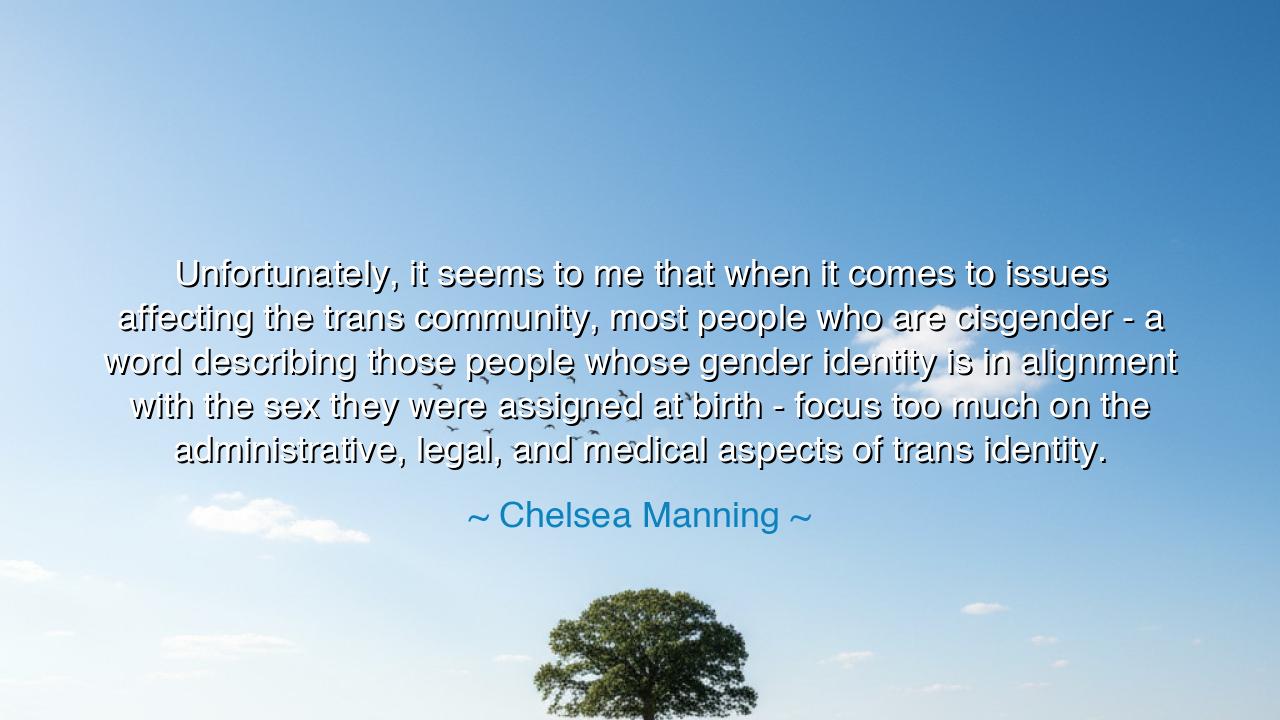
Unfortunately, it seems to me that when it comes to issues
Unfortunately, it seems to me that when it comes to issues affecting the trans community, most people who are cisgender - a word describing those people whose gender identity is in alignment with the sex they were assigned at birth - focus too much on the administrative, legal, and medical aspects of trans identity.






The words of Chelsea Manning shimmer with both sorrow and truth: “Unfortunately, it seems to me that when it comes to issues affecting the trans community, most people who are cisgender — a word describing those people whose gender identity is in alignment with the sex they were assigned at birth — focus too much on the administrative, legal, and medical aspects of trans identity.” In this statement lies a profound lament, not merely for misunderstanding, but for the failure of empathy — the human tendency to reduce the mystery of the soul to paperwork and policy. Manning, who has walked through both public persecution and personal transformation, speaks as one who has seen how society mistakes the outer structures of identity for its inner essence. She reminds us that law and medicine may govern the body, but they cannot contain the spirit.
From the beginning of civilization, humanity has wrestled with questions of identity and belonging. The ancients too had their hierarchies and definitions — citizens and slaves, men and women, those blessed and those cursed by divine decree. Yet every era has been marked by those who dared to step beyond those boundaries, who revealed that the categories we build are fragile, that the human being is something deeper, wider, and more luminous than any legal definition. In Manning’s words, we hear that same timeless cry — that the self cannot be reduced to a form, a diagnosis, or a bureaucratic category. To focus on the administrative and medical, while ignoring the human and emotional, is to mistake the temple for the deity within it.
The trans community, as Manning speaks of it, does not merely seek recognition under the law, though that struggle is necessary. What they truly seek is understanding — to be seen as whole persons, as souls who live, love, suffer, and hope. When the world reduces them to legal classifications, or treats their existence as a problem to be solved by regulation, it robs them of their humanity. It is as if a painter’s masterpiece were studied only for the weight of its canvas and the chemistry of its pigments, while the art — the beauty that moves hearts — is ignored. Manning’s insight calls us back to a deeper compassion, one that sees the person before the process, the heart before the label.
History is rich with examples of societies that failed to see the humanity behind difference. Consider the plight of Alan Turing, the mathematical genius who helped end the Second World War by breaking the Enigma code. Though his intellect saved countless lives, he was later persecuted by his own government for being gay — judged not for his mind or his contribution to humanity, but for his identity. The state’s legal and medical systems sought to “correct” him, destroying his body in the name of morality. Turing’s tragedy, like Manning’s reflection, reveals how the machinery of law and medicine can become blind to the soul they were meant to serve. The lesson repeats across centuries: whenever society worships procedure over compassion, it betrays its own humanity.
Yet there is also hope in these words. Manning’s critique is not born of despair, but of belief — belief that we can do better. To move beyond the administrative and legal, we must learn to see each other not as cases to be debated, but as living stories to be understood. This does not mean rejecting the necessity of laws or medicine; it means refusing to let them define the limits of empathy. The trans experience, like all human experiences, is not a technical condition but a spiritual journey — one of becoming, of reconciling the inner truth with the outer world. To honor that journey is to practice the highest form of humanity.
Manning’s words also remind us that the heart of justice lies not in the letter of the law but in its spirit. Laws may grant rights, but only understanding grants peace. The great reformers of history — from Socrates to Martin Luther King Jr. — all understood that progress requires more than policy; it requires a change in the moral imagination of a people. It demands that we learn to see those we once ignored as reflections of ourselves. Thus, the pursuit of justice for the trans community is not merely their fight; it is humanity’s test — to prove that compassion can evolve as fast as our institutions.
Let this be the lesson passed down to future generations: do not let your eyes grow dull to the soul behind the form. See the human being before the category, and let your laws and systems follow compassion, not the other way around. Speak not only of rights, but of recognition. Listen not only to experts, but to the voices of those who live the truth you cannot know. For when empathy precedes judgment, and when understanding walks before analysis, then and only then do we become worthy of the name human.
So remember, as Chelsea Manning teaches — the self is not a document to be signed, nor a diagnosis to be managed. It is a living flame, sacred and uncontainable. When you meet another, do not ask first what their paperwork says or what the law allows; ask what their soul feels, what their heart dreams. In that question begins not only the healing of the trans community, but the redemption of all who have forgotten how to see.






AAdministratorAdministrator
Welcome, honored guests. Please leave a comment, we will respond soon